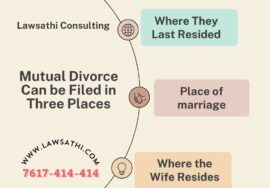Divorce Process
The process of getting a divorce can be difficult and emotionally taxing. Divorce requires legal procedures, the specifics of which can differ according to the jurisdiction. Here is a thorough overview of the typical divorce procedure:
Steps to Get a Divorce
Decide to Divorce
Mutual Agreement: If both parties agree to the divorce and its terms, the process is usually simpler and quicker.
Contested Divorce: If one party does not agree, the process can be more complicated and lengthy.
Hire an Advocate:
It is advisable to consult with a divorce attorney to understand your rights and obligations.
An attorney can help navigate the legal process and represent your interests.
File a Petition:
Petition for Divorce: The spouse seeking the divorce (the petitioner) files a legal document called a petition or complaint for divorce.
Grounds for Divorce: The petition outlines the grounds for the divorce.
Respond to the Petition:
The respondent can agree, disagree, or raise counterclaims to the issues in the petition.
The parties attempt to reach an agreement on key issues such as property division, child custody, child support, and alimony.
Mediation or collaborative divorce processes can be used to facilitate negotiation.
Trial:
If the parties cannot reach an agreement, the case goes to trial.
A judge hears evidence and arguments from both sides and makes a decision on the contested issues.
Finalizing the Divorce:
Divorce Decree: Get final judgment or decree of divorce.
This document outlines the terms of the divorce, including asset division, custody arrangements, and support orders.
Key Issues in a Divorce
Property Division:
Child Custody and Visitation:
Child Support:
Alimony/Spousal Support:
Divorce is a significant life event that involves legal, financial, and emotional challenges. By understanding the process and seeking appropriate legal and emotional support, individuals can navigate the divorce more effectively and work towards a fair and reasonable resolution.
Contact Information: You may contact us, we have expert and experienced team to assist you.
Divorce Process LSC Lawyers (Law Sathi Consultation)
Phone:- +91 7617 414 414
Email:- lawsathi@gmail.com
Website:- https://lawsathi.com/
Common questions and answers
1- How to file for mutual divorce in India?
Filing for mutual divorce in India involves several steps, and it’s important to follow the legal procedures to ensure a smooth process.
Consultation with a Lawyer: Prepare Joint Petition: Gather Required Documents: File the Petition: First Motion Hearing: Cooling-off Period: Second Motion Hearing: Decree of Divorce: Execution of Divorce Decree:
2- What documents are required for mutual divorce?
Wedding Card. Marriage Photograph. Passport size Photographs. Financial Affidavits. Property Settlement Agreement. Parenting plan (if applicable). Proof of residence and other relevant document.
3- How long does mutual divorce take in India?
In India, the time taken for mutual divorce proceedings can vary depending on various factors, including court workload, completeness of documentation, and mutual agreement between the spouses. However, typically, mutual divorce in India can take around 6 months to 18 months or more to be finalized.
4- What is the procedure for filing mutual divorce in India?
Procedure of filling mutual divorce is very simple- If both the parties agreed for mutual divorce than they need to talk to lawyer who is experienced and expert in family matters. They will guide you proper.
5- What are the advantages of a mutual consent divorce?
Time Efficiency: Reduced Emotional Stress: Efficiency: Resolution: Saves Resources: Potential for Reconciliation: Cost-Effective: Privacy and Confidentiality:
6- What are the grounds for divorce in India?
In India, divorce can be granted under various grounds as specified by different personal laws applicable to different religions. Here are the commonly recognized grounds for divorce across different laws: Adultery: Cruelty: Desertion: Conversion: Mental Disorder:
7- What is fee for mutual consent divorce?
The fee for mutual consent divorce in India varies depending on several factors, including the court where the divorce petition is filed and the lawyer’s fees.



